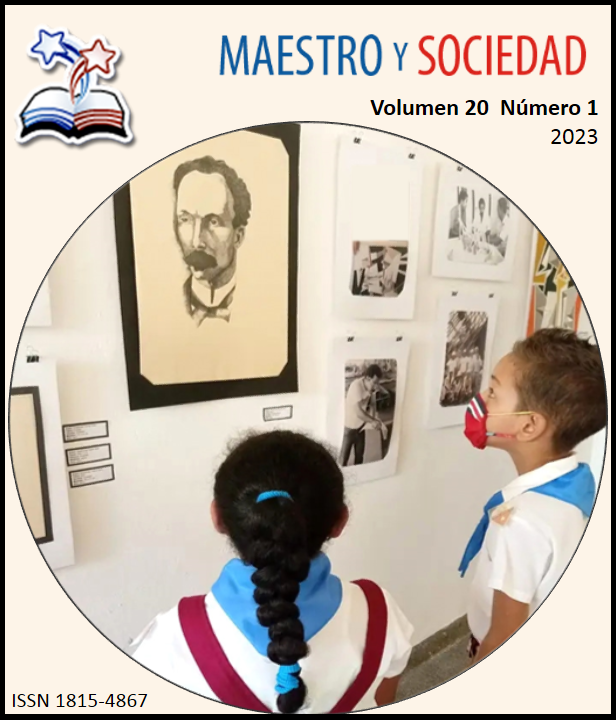Approach to reading comprehension from personal experiences and reading preferences
Approach to reading comprehension from personal experiences and reading preferences
Keywords:
comprehension, reading comprehension, reading experiences, reading preferencesAbstract
Introduction: The research presented emphasizes the search for new perspectives for the understanding of literary texts, taking advantage of the potential of personal experiences and the reading preferences of the students of the Bachelor of Education in Spanish-Literature for the achievement of learning. significant in the process of teaching to teach.
Materials and methods: It starts from an initial diagnosis with the purpose of knowing the personal experiences in reading and reading preferences, and from this, methodological ways are offered for the understanding of the text preferred by the students.
Results: The methodological pathways were applied in the educational teaching process of the first year of the degree, taking into account the possibilities offered by the system of objectives and contents of the subject Introduction to spatiality. The application of the proposal was evaluated through the interview of the participants and its relevance and practical utility were confirmed.
Discussion: Meaningful learning that converges with developer didactics is vital in the teaching-to-teach process.
Conclusions: The theoretical foundations of the current focus on the teaching of Spanish and literature: cognitive, communicative and sociocultural, as well as the theory of meaningful learning condition the search for practical ways for the student to learn how to teach from the beginning. reading comprehension process.
References
Ausubel, D. (1976). Psicología Educativa: Un enfoque cognoscitivo. Editorial Trillas.
Colomer, T. y Camps, A. (1992). Enseñar a Leer, Enseñar a Comprender. Ediciones Celeste.
Dubois, M. E. (1986). Interrogantes sobre la comprensión lectora. Revista RIDECAB, (14), 46-98.
Elche, M., Sánchez-García, S. y Yubero, S. (2019). Lectura, ocio y rendimiento académico en estudiantes universitarios del área socioeducativa. Revista Educación XX1, 22(1), 215-237. doi: 10.5944/educXX1.21548
Fuentes, S. y Renobell, V. (2020). El papel del sexo en comprensión lectora. Evidencias desde PISA y PIRLS. Revista de Investigación en Educación, 18(2), 99-117. Https://revistas.webs.uvigo.es/index.php/reined/article/view/2837
Loayza-Maturrano, E. F. (2022). Preferencias y hábitos de lectura en estudiantes universitarios. Revista ConCiencia EPG, 7(1), pp. - 36-51. https://doi.org/10.32654/CONCIENCIAEPG.7-1.3
Mañalich, R. (2007). La enseñanza del análisis literario: una mirada plural. Editorial Pueblo y Educación.
Montaño, J. R. (2006). La literatura y, en, desde, para la escuela. Editorial Pueblo y Educación.
Rodríguez, M. L., Moreira, M. A., Caballero, M. C., y Greca, I. M. (2010). La teoría del aprendizaje significativo en la perspectiva de la psicología cognitiva. Editorial Octaedro. www.cedro.org
Roméu, A. (2003). Teoría y práctica del análisis del discurso. Su aplicación en la enseñanza. Editorial Pueblo y Educación.
Sánchez, L.; Pérez, L. M. y Griffin, K. L. (2022). Preferencias de textos literarios y científicos según el grado universitario. Revista Didáctica. Lengua y Literatura, (34), 147-159, http://dx.doi.org/10.5209/dill.81362
Solé, I, (1992). Estrategias de lectura. Editorial Graó.
Varela, L., Pose-P, H., y Fraguela, R. (2019). Comparativa entre las preferencias de ocio de jóvenes lectores y no lectores en España. Revista Ocnos, 18 (2), 55-64. https://doi.org/10.18239/ocnos_2019.18.2.2028
Downloads
Published
How to Cite
Issue
Section
License
Copyright (c) 2023 Liliana Domínguez Diacén, Yulianela Lubén Matos, Yaneisi Peinado Jiménez

This work is licensed under a Creative Commons Attribution-NonCommercial-NoDerivatives 4.0 International License.
This journal provides immediate open access to its content, based on the principle that offering the public free access to research helps a greater global exchange of knowledge. Each author is responsible for the content of each of their articles.



























 Universidad de Oriente
Universidad de Oriente 